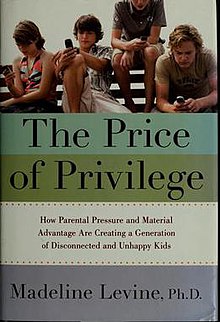
Parenting or child rearing promotes and supports the physical, emotional, social, spiritual and intellectual development of a child from infancy to adulthood. Parenting refers to the intricacies of raising a child and not exclusively for a biological relationship.

A dysfunctional family is a family in which conflict, misbehavior, and often child neglect or abuse on the part of individual parents occur continuously and regularly, leading other members to accommodate such actions. Children sometimes grow up in such families with the understanding that such a situation is normal. Dysfunctional families are primarily a result of two adults, one typically overtly abusive and the other codependent, and may also be affected by substance abuse or other forms of addiction, or sometimes by an untreated mental illness. Parents having grown up in a dysfunctional family may over-correct or emulate their own parents. In some cases, the dominant parent will abuse or neglect their children and the other parent will not object, misleading a child to assume blame.

The Pigman is a young adult novel written by Paul Zindel, published in 1968. It is notable for its authentic depiction of teenagers, and was among the first YA books to take the genre in a more realistic direction.
A helicopter parent is a parent who pays extremely close attention to a child's or children's experiences and problems, particularly at educational institutions. Helicopter parents are so named because, like helicopters, they "hover overhead", overseeing every aspect of their child's life constantly. A helicopter parent is also known to strictly supervise their children in all aspects of their lives, including in social interactions.
Dependency need is "the vital, originally infantile needs for mothering, love, affection, shelter, protection, security, food, and warmth."
Interpretation of Schizophrenia is a book by Italy-born American psychiatrist Silvano Arieti in which the author sets forth demonstrative evidence of a psychological etiology for schizophrenia.
Madeline Levine is a practicing psychologist in Marin County, California. She is the author of four books: Viewing Violence published in 1996, See No Evil: A Guide to Protecting Our Children from Media Violence published in 1998, The Price of Privilege: how parental pressure and material advantage are creating a generation of disconnected and unhappy kids published in 2006, and "Teach your Children Well" published in 2012. The first two books represent an analysis of the negative effects of media violence on child development. Her third book The Price of Privilege is a study of the psychological ailments plaguing teens from affluent families. The Price of Privilege is based not only on her 25 years of experience in treating such teens within Marin County but also on her consultations with colleagues around the United States—particularly research psychologist Suniya S. Luthar—as well as her review of the contemporary psychological research on the subject. "Teach Your Children Well" is marketed as "a toolbox for parents, providing information, relevant research and a series of exercises to help parents clarify a definition of success that is in line with their own values as well as their children’s interests and abilities."
An at-risk student is a term used in the United States to describe a student who requires temporary or ongoing intervention in order to succeed academically. At risk students, sometimes referred to as at-risk youth or at-promise youth, are also adolescents who are less likely to transition successfully into adulthood and achieve economic self-sufficiency. Characteristics of at-risk students include emotional or behavioral problems, truancy, low academic performance, showing a lack of interest for academics, and expressing a disconnection from the school environment. A school's effort to at-risk students is essential. For example, a study showed that 80% to 87% of variables that led to a school's retention are predictable with linear modeling. In January 2020, Governor Newsom of California changed all references to "at-risk" to "at-promise" in the California Penal Codes.
After-school activities, also known as after-school programs or after-school care, started in the early 1900s mainly just as supervision of students after the final school bell. Today, after-school programs do much more. There is a focus on helping students with school work but can be beneficial to students in other ways. An after-school program, today, will not limit its focus on academics but with a holistic sense of helping the student population. An after-school activity is any organized program that youth or adult learner voluntary can participate in outside of the traditional school day. Some programs are run by a primary or secondary school, while others are run by externally funded non-profit or commercial organizations. After-school youth programs can occur inside a school building or elsewhere in the community, for instance at a community center, church, library, or park. After-school activities are a cornerstone of concerted cultivation, which is a style of parenting that emphasizes children gaining leadership experience and social skills through participating in organized activities. Such children are believed by proponents to be more successful in later life, while others consider too many activities to indicate overparenting. While some research has shown that structured after-school programs can lead to better test scores, improved homework completion, and higher grades, further research has questioned the effectiveness of after-school programs at improving youth outcomes such as externalizing behavior and school attendance. Additionally, certain activities or programs have made strides in closing the achievement gap, or the gap in academic performance between white students and students of color as measured by standardized tests. Though the existence of after-school activities is relatively universal, different countries implement after-school activities differently, causing after-school activities to vary on a global scale.

Alcoholism in family systems refers to the conditions in families that enable alcoholism and the effects of alcoholic behavior by one or more family members on the rest of the family. Mental health professionals are increasingly considering alcoholism and addiction as diseases that flourish in and are enabled by family systems.
Effects of adoption on the birth mother include stigma and other psychological effects a woman experiences when she places her child for adoption.
Abuse of parents by their children, also known as child-to-parent violence (CPV), is a form of domestic violence, and is one of the most under-reported and under-researched subject areas in the field of psychology. Parents are quite often subject to levels of childhood aggression in excess of normal childhood aggressive outbursts, typically in the form of verbal or physical abuse. Parents feel a sense of shame and humiliation to have that problem, so they rarely seek help.
Slow parenting is a parenting style in which few activities are organised for children. Instead, they are allowed to explore the world at their own pace. It is a response to concerted cultivation and the widespread trend for parents to schedule activities and classes after school; to solve problems on behalf of the children, and to buy services from commercial suppliers rather than letting nature take its course.
The effects of domestic violence on children have a tremendous impact on the well-being and developmental growth of children witnessing it. Children who witness domestic violence in the home often believe that they are to blame, live in a constant state of fear, and are 15 times more likely to be victims of child abuse. Close observation during an interaction can alert providers to the need for further investigation and intervention, such as dysfunctions in the physical, behavioral, emotional, and social areas of life, and can aid in early intervention and assistance for child victims.
Tiger parenting is a form of strict parenting, whereby parents are highly invested in ensuring their children's success. Specifically, tiger parents push their children to attain high levels of academic achievement or success in high-status extracurricular activities such as music or sports.

Suniya S. Luthar is Founder and executive director of AC Groups nonprofit, Professor Emerita at Teachers College-Columbia University, and Co-founder Emerita at Authentic Connections Co. She had previously served on the faculty at Yale University's Department of Psychiatry and the Yale Child Study Center and as Foundation Professor of Psychology at the Arizona State University.
Parentification or parent–child role reversal is the process of role reversal whereby a child or adolescent is obliged to act as parent to their own parent or sibling.
Jeanne Brooks-Gunn is an American developmental psychologist and professor. She is currently the Virginia and Leonard Marx Professor of Child Development at Teachers College, Columbia University.

Maggie Dent is an Australian parenting author, educator and speaker. She has written a number of books, holds and speaks at events in Australia, and appears on radio and television. She is the host of the ABC’s Parental As Anything podcast.

Love In, Love Out: A Compassionate Approach To Parenting Your Anxious Child is a 2020 non-fiction book by Malie Coyne. It was first published on 23 July 2020 through HarperCollins.







